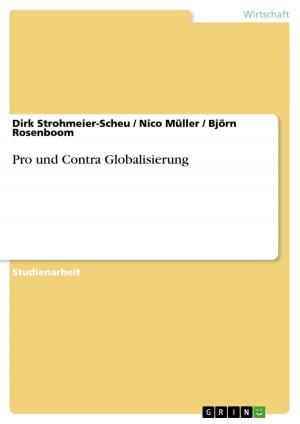'Abandon All Hope' - consumerism and loss of identity in Bret Easton Ellis's 'American Psycho' as an example of blank fiction
In comparison to selected modernist writings
Nonfiction, Entertainment, Drama, Anthologies| Author: | Anja Schiel | ISBN: | 9783638039666 |
| Publisher: | GRIN Verlag | Publication: | April 23, 2008 |
| Imprint: | GRIN Verlag | Language: | English |
| Author: | Anja Schiel |
| ISBN: | 9783638039666 |
| Publisher: | GRIN Verlag |
| Publication: | April 23, 2008 |
| Imprint: | GRIN Verlag |
| Language: | English |
Thesis (M.A.) from the year 2005 in the subject American Studies - Literature, grade: 1,5, University of Hamburg (Sprach-, Literatur- und Medienwissenschaft), 59 entries in the bibliography, language: English, abstract: Bret Easton Ellis's American Psycho has been labeled many things from 'Brat Pack Fiction' to 'Generation X' to 'Minimal Realism'. While the classification of the novel might be difficult and it has often been misunderstood for its extremely violent scenes, what is clear to the attentive reader is its critique of consumer culture Critics have acknowledged an emergence of a large number of writings dealing with this topic in contemporary American literature in the recent past. These novels focus on the relationship of American youth with consumer culture with a seemingly non-elaborate content and style. Attempts of explaining this kind of writing, which has also been called 'fiction of insurgency', 'new narrative', 'downtown writing' and 'punk fiction', range from millennial angst to the classification of this literary movement as part of the postmodern culture. What seems clear is that these narrations are closely related to the society they have been created in. The way these texts incorporate products of their time as a constant accompanying element places them very clearly in a specific time period. The apparent non-existence of complexity concerning the style, which at times reminds the reader of a movie script or a sequence of an MTV video, has, in the case of American Psycho, caused many critics to classify the novel as boring and deny the author the status of an artist. Exactly this seeming meaninglessness of these novels argues in favor of a term introduced by critics James Annesley and Elizabeth Young: Blank fiction, or Blank Generation Fiction. The term Blank fiction seems to capture perfectly the emptiness created by consumer culture that has found its way into these narratives not simply in its context but also by means of its language, incorporating consumer goods into the narrative as secondary characters, in the case of American Psycho ascribing more character to these objects than to the protagonists.
Thesis (M.A.) from the year 2005 in the subject American Studies - Literature, grade: 1,5, University of Hamburg (Sprach-, Literatur- und Medienwissenschaft), 59 entries in the bibliography, language: English, abstract: Bret Easton Ellis's American Psycho has been labeled many things from 'Brat Pack Fiction' to 'Generation X' to 'Minimal Realism'. While the classification of the novel might be difficult and it has often been misunderstood for its extremely violent scenes, what is clear to the attentive reader is its critique of consumer culture Critics have acknowledged an emergence of a large number of writings dealing with this topic in contemporary American literature in the recent past. These novels focus on the relationship of American youth with consumer culture with a seemingly non-elaborate content and style. Attempts of explaining this kind of writing, which has also been called 'fiction of insurgency', 'new narrative', 'downtown writing' and 'punk fiction', range from millennial angst to the classification of this literary movement as part of the postmodern culture. What seems clear is that these narrations are closely related to the society they have been created in. The way these texts incorporate products of their time as a constant accompanying element places them very clearly in a specific time period. The apparent non-existence of complexity concerning the style, which at times reminds the reader of a movie script or a sequence of an MTV video, has, in the case of American Psycho, caused many critics to classify the novel as boring and deny the author the status of an artist. Exactly this seeming meaninglessness of these novels argues in favor of a term introduced by critics James Annesley and Elizabeth Young: Blank fiction, or Blank Generation Fiction. The term Blank fiction seems to capture perfectly the emptiness created by consumer culture that has found its way into these narratives not simply in its context but also by means of its language, incorporating consumer goods into the narrative as secondary characters, in the case of American Psycho ascribing more character to these objects than to the protagonists.















